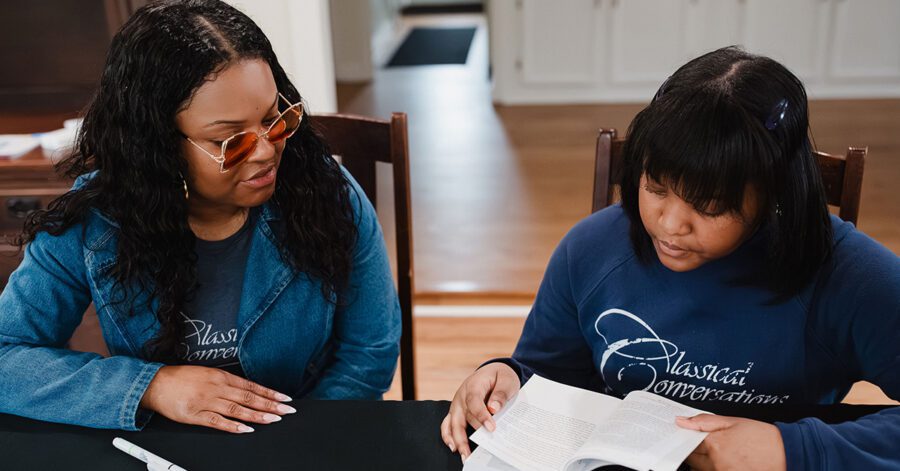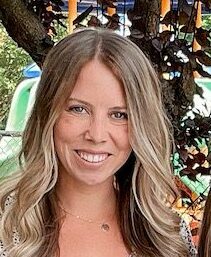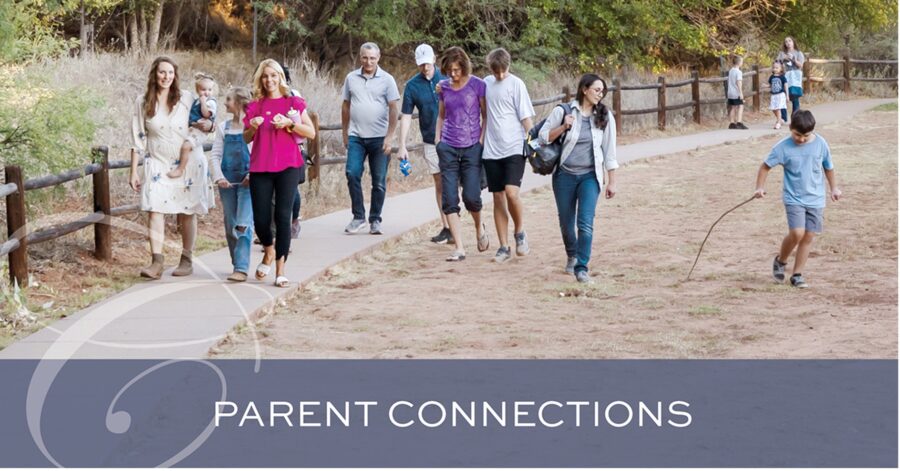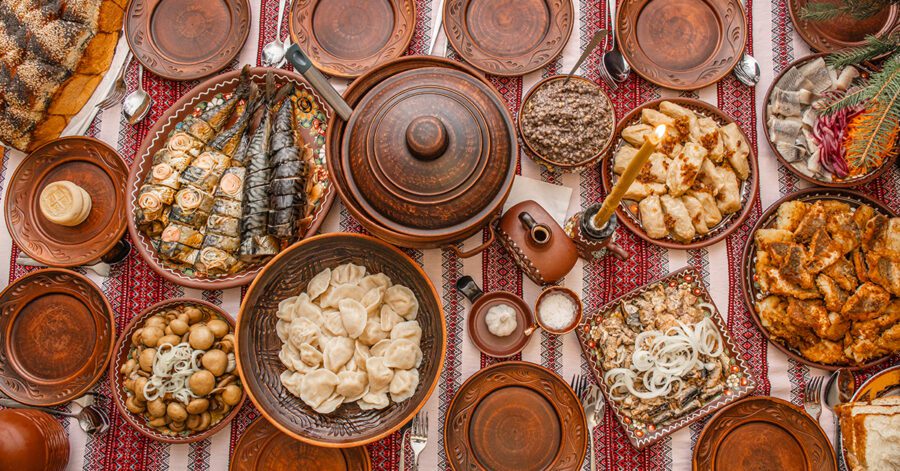As your student approaches graduation from Foundations, the question grows louder: What comes next? For many families, the answer is the Challenge program, Classical Conversations’ rich and ambitious classical homeschool experience for students ages twelve and up. But new questions follow. Is the Challenge program hard? Will my student thrive in Socratic discussion? Can I really guide my teen through middle and high school at home?
Can you successfully guide your student through the Challenge program homeschool curriculum? The answer is YES!
The good news: the Challenge program is designed for your success as a parent, not just your student’s. You don’t need all the answers or a teaching degree. What you need is a willingness to learn alongside your teen, a commitment to practicing the classical arts of grammar, dialectic, and rhetoric, and three guiding principles that will steady you through the journey ahead.
Tip #1: Define Your Terms
Before you open the Challenge curriculum guide or worry about the Challenge student’s workload, you need to answer three fundamental questions. Think of these definitions as the foundation of a house: everything you build in the Challenge program will rest on them. Without a solid foundation, even the most beautifully constructed curriculum will feel shaky. These definitions will shape every decision you make, from how you assess your student’s work to how you respond when the rigor feels overwhelming.
What is a Human?
This might seem like a strange place to start when you’re trying to figure out how to succeed in Challenge, but it’s the most important question you’ll answer. Genesis 1:27 tells us that God created man in His own image. Ephesians 2:10 reminds us that we are His workmanship, created in Christ Jesus for good works. Your student, whether they’re entering Challenge A at twelve or jumping into Challenge I at fourteen, is an image-bearer created for eternity with God and for good works beyond what you can imagine right now.
This truth transforms how you approach the Challenge program. When your student struggles with a persuasive essay or feels lost in seminar discussion, you’re not watching someone fail to master content. You’re walking alongside an image-bearer learning to think, speak, and reason in ways that reflect the God who made them. Each Challenge program’s book list isn’t just a collection of great works to be conquered. It’s a conversation across centuries about truth, goodness, and beauty, inviting your student to join that ongoing dialogue.
What is Education?
If you’ve chosen Classical Conversations, you likely share the conviction that the purpose of education is to know God and to make Him known. Colossians 1:17 declares that Christ is before all things, and in Him all things hold together. Because God is the Creator and Sustainer of the world, He is also the Creator and Sustainer of everything studied in the Challenge program. American literature, Latin grammar, and the scientific method, when studied rightly, all point back to Him and reveal His character.
This classical Christian worldview means that education isn’t about filling your student’s head with disconnected facts. The Challenge program trains students through grammar, dialectic, and rhetoric to see connections: between science and theology, between history and philosophy, between mathematics and beauty. Your role as a parent isn’t to be the expert in every subject. It’s to help your student practice the classical arts so they can discover those connections for themselves.
What is Your End Goal?
Every family’s answer will look slightly different, but defining this together matters. Are you aiming to raise graduates who can articulate their faith with clarity and courage? Students who approach problems with critical thinking and humility? Young adults who love learning and pursue wisdom?
When the Challenge weekly schedule feels packed and expectations seem high, coming back to your family’s end goal will help you make wise decisions about what to prioritize. These definitions—of humanity, education, and your family’s purpose—need to steer every choice you make in the Challenge program.
Listen to The Heart of Homeschooling: Relationships Over Academics
Tip #2: Know Your Resources
The Challenge program provides more support than you might realize, but only if you know where to look and how to use what’s available. Success in Challenge doesn’t come from doing everything perfectly. It comes from leveraging the resources designed specifically to help you guide your student through this substantive homeschool curriculum.
Four essential resources will shape your Challenge experience:
- Your Challenge Guide: Your roadmap for the entire academic year, outlining the six strands, weekly rhythms, and assessment guidelines.
- Your Student’s Tutor: Your partner in facilitating discussions, modeling learning, and supporting both you and your student.
- Parent Equipping Resources: Books, podcasts, and Parent Practicums that deepen your understanding of classical education.
- CC Connected: Online platform with strand-specific notes, video tutorials, literature snapshots, and discussion guides.
Read Your Challenge Guide Thoroughly
The Challenge curriculum guide isn’t just a syllabus. It’s your roadmap through the entire academic year, and it’s written with the understanding that you, the parent, are your student’s primary teacher. Classical Conversations Challenge Tutors facilitate community discussions and model learning, but they aren’t replacing you. They’re partnering with you.
Start by reading through the entire guide before the academic year begins. The first section is the Why, casting a vision for the strands and curriculum for your year. In the 2nd section, you will find the What, 30 weeks of what to at home and in community. The final section gives you the How, guidelines for how to tackle each strand and helps for special assignments like speeches, debates, and essays.
Notice the rhythm of the Challenge weekly schedule: students complete coursework at home, then come to community prepared for discussion, debate, and hands-on experiments. Understand the six strands (Logic, Research, Reasoning, Debate, Grammar, and Exposition) and how they work together. Mark the pages that explain how to assess your student’s work, and utilize the Academic Integrity section to maintain high ethical standards. The more familiar you are with the guide, the more confident you’ll feel as the academic year unfolds.
Read more about Academic Integrity in Homeschooling
Build a relationship with your student’s Challenge Tutor
One of the greatest gifts of the Challenge program is the partnership between parent, Tutor, and student in community. Your student’s Tutor has been equipped through Classical Conversations training to facilitate meaningful discussions and guide students toward deeper understanding. They know their program’s curriculum. They’ve likely walked other families through the same questions you’re asking.
Your Tutor will take time early in the academic year to connect with you. Ask about their approach to seminar discussions. Find out how they will communicate about your student’s progress. Let them know your family’s goals and any concerns you have. This relationship becomes especially valuable when life becomes stressful or unplanned family situations arise. Your student might struggle with the transition from Essentials to Challenge A or find the Challenge I debate requirements overwhelming. Your Tutor is there to support both you and your student through those moments.
Learn more about the Parent, Student, Tutor Partnership
Invest in Parent Equipping Resources
You don’t need to become an expert in classical education overnight, but growing in your understanding of the classical model will transform your experience of the Challenge program. Classical Conversations offers Parent Practicums, the Everyday Educator podcast, and books specifically designed to help parents grasp the why behind what their students are learning.
When you understand the purpose of Socratic discussion in Challenge seminar, you’ll feel less anxious when your student doesn’t have all the answers. When you’ve learned about the Five Canons of Rhetoric, you’ll recognize them at work in your student’s persuasive essays and presentations. These equipping resources remind you that the Challenge program isn’t a checklist to complete. It’s a training ground where students practice the classical arts that will serve them for life.
You can earn a Certificate in Classical Studies through CC Plus
Make CC Connected Your Weekly Habit
Classical Conversations’ online platform, CC Connected, holds a wealth of time-saving resources: strand-specific teaching notes, literature snapshots, video tutorials, and discussion guides. Spending fifteen minutes each weekend reviewing the upcoming week’s materials can save you prep time and confusion later.
The Challenge resources on CC Connected are particularly valuable for parents new to the program. You’ll find guidance on everything from helping your student prepare for Challenge debate tournaments to understanding the difference between Challenge levels. Make exploring CC Connected part of your Challenge weekly schedule, and you’ll discover that what initially seemed overwhelming becomes manageable.
Explore How to Get the Most Out of CC Connected
Tip #3: Model a Love of Learning
Your student is watching you. Not just to see if you can explain a math concept or parse a Latin sentence, but to observe something far more important: Are you still learning? Do you still ask questions? When you encounter something you don’t understand, do you respond with curiosity or frustration?
Think of yourself as a gardener tending alongside your student in the same soil. You’re not standing at a distance pointing out which plants to water. You’re kneeling in the dirt beside them, pulling weeds from your own section, marveling at unexpected blooms, and occasionally discovering you’ve been nurturing a weed you mistook for something beautiful. Your student doesn’t need to see perfection. They need to see someone who keeps tending the garden.
The Challenge program equips students to practice the arts of dialectic and rhetoric, as found in the classical trivium. They’re learning to ask hard questions, examine arguments, engage in meaningful debate, and articulate their own reasoned positions. This season of learning can feel unsettling for parents accustomed to having answers. Your thirteen-year-old in Challenge B might ask questions about government that you’ve never considered. Your sixteen-year-old in Challenge III might challenge assumptions you’ve held for decades.
This is exactly what should happen in a rigorous classical homeschool curriculum, and it’s beautiful.
Learn more about Becoming a Lead Learner
Model Education Beyond the Diploma
When you model a love of learning, you show your student that education doesn’t end with a diploma. You demonstrate that wisdom comes through humility, that asking good questions matters more than always having right answers, and that the pursuit of truth is a lifelong adventure. Read books from the Challenge program book lists alongside your student. Admit when you need to research something further before forming an opinion. Engage in the dinner table discussions that naturally flow from studying Shakespeare, American history, or the philosophy of economics.
Your student needs to see you falling more in love with God and His people through your studies. They need to watch you practice what the Challenge program teaches: that all knowledge connects, that learning shapes character, and that classical Christian education isn’t about performance, it’s about formation.
The Challenge years are full of growth for both parents and teenagers. You’ll be stretched. You’ll wonder if you’re doing enough. You’ll have weeks when your Challenge student’s workload feels like too much, and community day can’t come soon enough. But you’ll also witness your student discovering their voice, defending their faith with clarity, and developing a love for learning that will serve them long after Challenge IV ends.
Stay grounded in truth. Use the resources before you. Stay connected in community. And above all, enjoy this wild, wonderful season of learning together.
Frequently Asked Questions About the Challenge Program
What age is the Challenge program for?
The Challenge program serves students ages twelve and up, beginning with Challenge A for students typically twelve years old. The program progresses through six levels: Challenge A (age 12+), Challenge B (age 13+), Challenge I (age 14+), Challenge II (age 15+), Challenge III (age 16+), and Challenge IV (age 17+). Students usually spend one year at each level, though families can adjust pacing based on individual readiness.
How many hours per week does the Challenge program require?
Challenge students should expect to invest approximately 20-25 hours per week on their studies, including both at-home coursework and community time. This includes reading, writing, problem-solving, research, and preparation for seminar discussions. The Challenge weekly schedule includes one full day in community (typically meeting for 6-7 hours), with the remaining work completed at home over four days.
What’s the difference between Challenge A and B and Challenge I through IV?
Challenge A and Challenge B serve as a bridge between the grammar-focused Foundations years and the high school Challenge levels. These programs mix grammar and dialectic materials while introducing basic rhetorical skills, with intentional literature to allow students to develop strong writing skills.
Challenge I through Challenge IV represent the classical homeschool high school years. These levels involve significantly more reading and writing, deeper engagement with primary sources, and more sophisticated application of dialectic and rhetorical skills. Students in Challenge I-IV encounter college-level content and can earn college credits through CC Plus if desired.
Do parents teach the Challenge program, or do Tutors?
Parents remain their student’s primary teacher throughout the Challenge program. Challenge Tutors facilitate weekly community seminars where they model learning, lead discussions, and guide students through experiments and presentations. However, parents are responsible for helping their students manage the Challenge student workload at home, assessing completed work, and assigning grades according to their state standards. Tutors partner with parents but don’t replace the parent’s role as teacher.
Is the Challenge program accredited?
Classical Conversations is not an accredited institution, and the Challenge program is not an accredited curriculum. However, this doesn’t limit your student’s educational or career opportunities. Classical Conversations offers resources to help families create comprehensive transcripts for documenting their coursework and provides access to partners who can assist with navigating college admissions, scholarship applications, and standardized testing.
The Challenge program offers concurrent enrollment to earn college credit while still in high school through the CC Plus program, which can strengthen transcripts and reduce college costs regardless of accreditation status.





